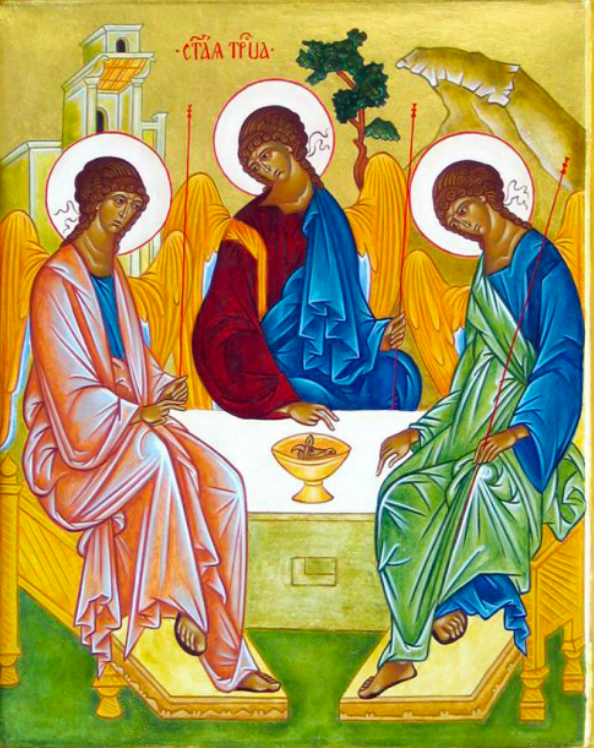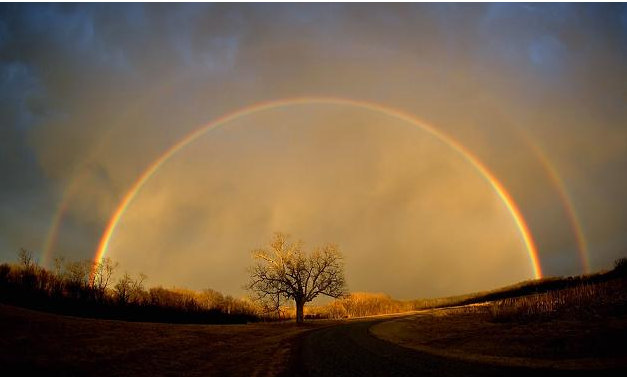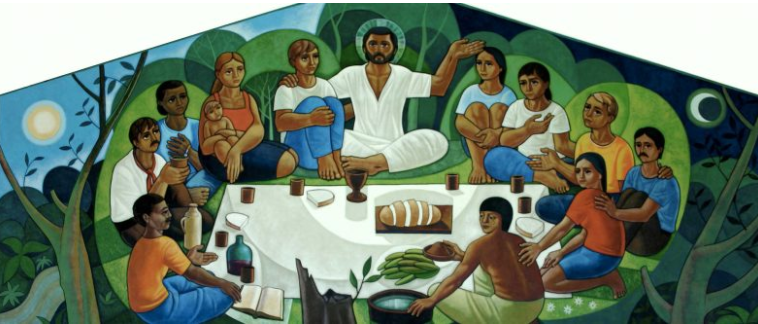
Human beings without spirituality are like a mobile phone without connection and without battery, or like a computer disconnected from the Internet line. Everything changes when there is a connection. This is when an impressive, unimaginable world opens up to us: there is science, the answer to millions of questions, there we find art, crafts, the voices of humanity, the explanation of many phenomena of nature, instant conversation and the encounter with those who are far away. It doesn’t matter where we are: in what country, at what time, in what situation. Hence, our most frequent question, when we arrive at a place, is this: Is there a connection? Human beings connect with spirituality when we connect with that Divine-Wifi that fills the face of the Earth: the Spirit of God Abba-Creator and the Spirit of the Risen Jesus! Spirituality is our connection with the Holy Spirit and all that world that appears in one way or another to everything visible and tangible. The encyclical “Laudato Sì” invites us to this connection. From “integral ecology” one passes to “integral and holistic spirituality”, which is ecological spirituality.
Ecological spirituality: outlines of spirituality
Christian spirituality is illuminated in us as soon as we connect with the Spirit of God-Abba Creator and of Jesus—the risen Lord. Through this connection, we discover an immense world in which we are immersed, where the Creator of all “the visible and the invisible” has placed us.
- There is not only what we see and feel and that is accessible to our senses: visible creation.
- There is also the other creation: the invisible one; that which is accessible to us from our spirit. To pure and hard materialism speaking of invisible realities seems like a baseless superstition.
- Whoever connects with the Spirit “lights up” the house: he discovers the true face of things, of matter.
- Spirituality is “passion for the Whole”: the spectacle of the connection of the visible and the invisible and the energy that comes from that connection.
- The encyclical “Laudato Sì” invites us to this super-connection with the Whole that it calls “ecological” Christian spirituality.
- There is a whole world to discover and experience. Jesus invited us to enter it: When the Spirit comes … that I will send you in the name of the Father He will make you see everything!
However…
“The outer deserts multiply in the world because the inner deserts have spread”
Pope Benedict XVI at the beginning of his Pontificate
Ecological spirituality makes us abandon the interior desert: it is coexistence and communion; connect our body to nature. Invites us to coexistence and communion; it makes us discover the common House in which we all live. Ecological spirituality makes us not mock environmental concerns, but take them very seriously; it leads us to change our life habits, it makes us rediscover our vocation as “caretakers” and “protectors” of the Creator’s work.

Traits and attitudes of ecological spirituality
Those who connect with the Spirit of Creation immediately realizes that thy are not alone, but that they are part of an immense life; they perceives that one is not disconnected from other creatures; that we form a magnificent Everything. We are participants in a precious universal communion. Everything is intertwined!
This awareness arouses in us various attitudes:
- Gratitude: the Eucharist is the permanent thanksgiving for the All in which we are inserted. The Psalms are thanksgiving. There is no person more miserable than the one who never has reason to say Thank You! Gratitude leads us to “love and accept the wind, the sun or the clouds, even if they are not subject to our control” (LS, 228).
- Gratitude: whoever experiences Grace becomes gratuitous, gives himself up, offers himself to the creator God to solve the dramas of the world “as a living sacrifice, holy and pleasant” (Rom 12:1) (LS, 220). Surrender means developing your own creativity and igniting your own enthusiasm to “give” the best of ourselves to others, to the world, to creation (LS, 211). No one is so rich that he does not need others. No one is so poor that he or she cannot give something peculiar to others.
- Without narcissism: the narcissist disconnects from everything: for him or her only his/her world exists … everything reduces him/her to his/her own world. Our Master in the art of passion for everything (“the one who shed his blood for everyone”) warns us: “Let your left hand not know what the right is doing…”. Loving conscience leads us to lose everything to gain everything (LS, 220).
- These attitudes can lead us to intense spiritual experiences, which are experienced when we make gestures of kindness towards nature, and of love towards society, committing ourselves to what belongs to everyone and defending it (LS, 232). This is how charity is expressed in its ecological dimension.
Convictions of ecological spirituality
The person who lives consciously and feels grateful for a “new consciousness” gradually acquires certain convictions. And from them, later, a coherent and transformative behavior emerges. The convictions that a person affected by ecological spirituality reaches are the following:
- Each creature reflects something of God and has a message to convey (LS, 221).
- Jesus the Christ assumed in himself this material world by his incarnation; and by his Resurrection he dwells in the most intimate of each being (LS, 221).
- God-Abba is without pause creating and inscribing in his creation an order and a dynamism that—as conscious beings—we should not ignore. From the scientific world the Spirit of God speaks to us, teaches us, offers us keys to understand his work. As Andrés Torres Queiruga says “God is not as religious as he seems”.
- We are convinced that conversion to ecological spirituality does not threaten anyone. On the contrary, it provokes that sublime fraternity and sorority with everything created that Saint Francis of Assisi lived so brilliantly and to which we are increasingly sensitive in our humanity (LS, 218).
- A practical conviction that follows from the above: “Less is more”: consumption consumes us. Instead, sobriety makes us enjoy with very little; it leads us to limit needs that stun us, and opens us to possibilities that are offered to us (LS, 222). Simplicity of life leads us to value the small, to be grateful for the possibilities that are offered to us, to live without attachments and to avoid the dynamics of domination (LS, 222).
The celebratory rest: the ecological dimension of the Liturgy
The Holy Spirit is the Spirit not only of the interior, but also of the exteriority: not only the interior life, but also the exterior life! The same Spirit of the Cenacle was the one who launched the first community into the squares, the streets, the paths of the world, the spaces of nature … and there He also accompanied them.

- The Spirit is present and acting in nature. “The essential is invisible to the eyes”. The Spirit is “on a leaf, on a road, in the dew, on the face of the poor… God is not only found inside, also outside… in all things. The mystic feels that all things are in God (LS 234).
- The Sacraments of the Spirit invite us to embrace the world on a different level: They invite us to embrace the world on a different level: spilling water, oil, fire, colors, a blessing hand. They indicate that nature is a means of encounter With God.
- In the Eucharist the Lord comes in a piece of matter (LS, 236). The Eucharist unites heaven and earth, embraces and penetrates everything created. The world that came out of the hands of God returns to Him in happy and full adoration. In the Eucharistic Bread, “creation is oriented towards divinization, towards holy weddings, towards unification with the Creator himself” (LS 236).
- Sunday is the day of healing of relationships, the day of Resurrection and the new creation, the day that never rest, the day that sheds its light on the Week (LS, 237).
“Christianity does not reject matter. Rather, bodiliness is considered in all its value in the liturgical act, whereby the human body is disclosed in its inner nature as a temple of the Holy Spirit and is united with the Lord Jesus, who himself took a body for the world’s salvation” .
Laudato Si, 235
Prayer
Father Creator,
how much you loved our planet
that you sent us your Beloved Son,
pour out your Spirit upon us
so that it generates in us
that ecological spirituality
to launch us to commit and fight
so that the progressive destruction of the land is avoided;
expand our narrow minds
and grant us a new consciousness to discover
our new planetary identity,
and to connect with “the invisible”, that You created,
and discover its transparency in everything visible.
Amen.
To contemplate:
EVERYTHING IS CONNECTED
Dustin Hoffman
English Translation: Fr. Alberto Rossa, cmf
Impactos: 1109
